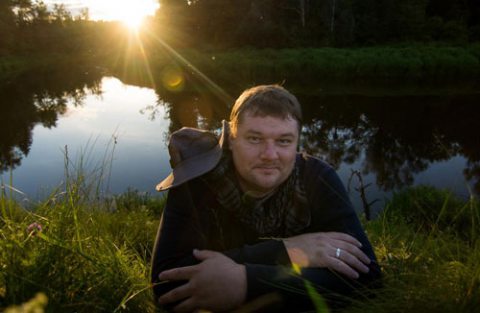Siarhei Balai: I put the question to which people need to answer on their own
-

- Photographer Siarhei Balai
Before the opening of the photo exhibition "Capital Punishment" depicting mothers of the executed death row convicts, its author, photographer Siarhei Balai, gave an interview to the Human Rights Centre "Viasna".
- Sergei, how did you come to the idea just such an exhibition?
Siarhei Balai: I came to the idea of a photo project on the theme of death in 2013, but had to take some time to form a certain concept, the idea of the material. The main impetus was the fact that, according to the Independent Social Research, conducted by Russian sociologists in 2012-2013, more than half of Belarusians believe that in our country there is a moratorium on the death penalty.
Moreover, while implementing the project and communicating with the relatives of the shot people, I learned that they also used to have such convictions before their relatives faced this problem.
- Weren't you afraid that that your work may cause a backlash and people will tell you that you defend murderers?
S.B.: No, I was not afraid, because first of all I wanted to set the record straight for myself. The more that the topic of the death penalty seems to be a taboo in the society, there is little information about it and ordinary Belarusians start thinking about it only in extreme cases. Moreover, my journalist practice shows that even much less celebrated topics can cause a a lot of disturbances and
give birth to opposite opinions. Besides, I don't defend murderers (and the state which takes the power to enforce death sentences, also acts in a similar role) - I just put the questions to which people need to answer on their own.
- How did you feel working on such psychologically difficult topic? Did you have an insight, enlightenment? Have you discovered something new?
S.B.: The work was really difficult, because I am very emotional and sentimental person, and take other people's trouble close to my heart. But I am well aware that this is also a new experience, including the moral dimension. While working with my heroes I sometimes discovered many new circumstances and it is obvious that my project won't stop with this exhibition, but will develop, as the the issue really requires a very deep study.
- What hindered (or helped) you and your assistant in the implementation of the creative idea?
S.B.: The main obstacle was that the present situation embittered many of the relatives of the executed and the people just keep their pain inside, like a turtle in its shell. Sometimes it was quite difficult to make them talk, to say nothing of photography. What helped me was that among them there were those who supported to implement the idea athwart their pain, feeling their their own involvement in the common struggle for refusal from the death penalty.
- What would you say to a supporter of the death penalty?
S.B.: I think the advocates of the death penalty should consider why elderly people and citizens of provinces mainly speak against the death penalty. Most probably this is because having lived a long life they understand that there is nothing more precious than that. And even revenge is not a reason to take the life of a person. In any case, everyone should answer such questions. It is natural to ask them to oneself, since this is where our civic responsibility dwells: is an individual ready to take the responsibility for the fact that someone will take the life of another person (even a criminal)? We shouldn't forget about the possibility of a miscarriage of justice, either.

